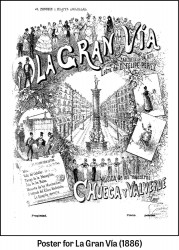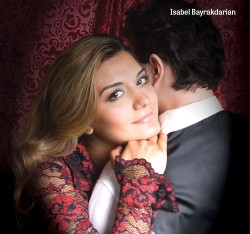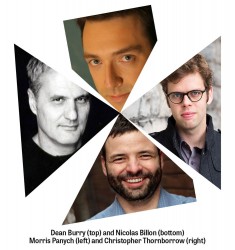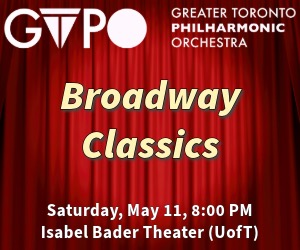On November 1, after the COC’s new production of Verdi’s Falstaff and Opera Atelier’s new production of Handel’s Alcina both finish their runs, Toronto’s smaller opera companies take centre stage to explore rarities and brand new works.
 La Gran Vía: Operas from the seldom-heard Spanish repertoire bookend the month. On November 2, Toronto Operetta Theatre presents the Canadian premiere of La Gran Vía (1886) by Federico Chueca (1846-1908) and Joaquín Valverde (1846-1910). La Gran Vía will be the latest zarzuela, or Spanish version of operetta, that the TOT will have introduced to Canadian audiences. Unlike the previous zarzuelas, however, La Gran Vía is not realistic and romantic but surrealistic and satiric. The subject concerns the plan to build La Gran Vía in Madrid – a wide, modern boulevard like those Haussmann built in Paris between 1853 and 1870. Like Haussmann’s boulevards, La Gran Vía would entail the destruction of many old streets and neighbourhoods.
La Gran Vía: Operas from the seldom-heard Spanish repertoire bookend the month. On November 2, Toronto Operetta Theatre presents the Canadian premiere of La Gran Vía (1886) by Federico Chueca (1846-1908) and Joaquín Valverde (1846-1910). La Gran Vía will be the latest zarzuela, or Spanish version of operetta, that the TOT will have introduced to Canadian audiences. Unlike the previous zarzuelas, however, La Gran Vía is not realistic and romantic but surrealistic and satiric. The subject concerns the plan to build La Gran Vía in Madrid – a wide, modern boulevard like those Haussmann built in Paris between 1853 and 1870. Like Haussmann’s boulevards, La Gran Vía would entail the destruction of many old streets and neighbourhoods.
The zarzuela begins, in fact, with a collection of these threatened streets and plazas, personified and gathered to complain about the new boulevard. Two allegorical characters enter, El Paseante (the stroller) and the Caballero de Gracia (the graceful gentleman) to explain how the boulevard is unlikely to be built for a long time due to lack of funding and municipal infighting. (How right they are since the real Gran Vía was not begun until 1904 and completed in 1929!) Further allegorical figures include Prosperidad, Pacífico, Injurias, Petroleum and Gas. After many satirical swipes at contemporary scandals in Madrid (continually updated in performance), the piece concludes with the unveiling of the completed boulevard and a salute to the Madrid of the future. The zarzuela was a huge success in Madrid and eventually went on to further success in Paris, Vienna and Prague. Indeed, the work’s satire of city planning and the destruction of old neighbourhoods is something that any large city, including Toronto, should be able to appreciate. The show features Margie Bernal, Fabian Arciniegas, Pablo Benitez and Diego Catala with José Hernández as pianist and music director.
Voicebox: On November 30 Voicebox: Opera in Concert presents La Vida Breve (1913) by Manuel de Falla (1876-1946). La Vida Breve was Falla’s first opera, his previous works for the stage all having been zarzuelas. The libretto written in Andalusian dialect concerns the gypsy Salud who is in love with the wealthy man Paco. He has led her on, not telling her he is already engaged to be married to a woman of his own class. Salud’s uncle and grandmother know Paco’s secret and try to dissuade Salud from interrupting Paco’s wedding. But all is in vain and tragedy results. French composer Claude Debussy directly influenced Falla in transforming the work first written as a number opera into one with a more continuous orchestral flow.
Performers include Isabel Bayrakdarian, Ernesto Ramírez and Guillermo Silva-Marin. José Herández is the pianist and music director and Robert Cooper is the director of the Voicebox Chorus.
 Tapestry Opera: In between these two Spanish-centred evenings, Tapestry Opera launches its 35th season by providing a glimpse into the future of opera with TapestryBriefs: Booster Shots running November 13 to 16. The Booster Shots consist of ten new short operas performed in and around the Distillery Historic District. Each night begins in the Ernest Balmer Studio, Tapestry’s studio and bar, with subsequent scenes taking place in other Distillery spaces – from freight elevators and brick-lined halls, to intimate corners and public galleries.
Tapestry Opera: In between these two Spanish-centred evenings, Tapestry Opera launches its 35th season by providing a glimpse into the future of opera with TapestryBriefs: Booster Shots running November 13 to 16. The Booster Shots consist of ten new short operas performed in and around the Distillery Historic District. Each night begins in the Ernest Balmer Studio, Tapestry’s studio and bar, with subsequent scenes taking place in other Distillery spaces – from freight elevators and brick-lined halls, to intimate corners and public galleries.
The ten operas will be performed by various combinations of only four singers. Newcomer, soprano Catherine Affleck, a recent graduate of Yale University School of Music, joins familiar Tapestry performers baritone Alex Dobson, tenor Keith Klassen and mezzo soprano Krisztina Szabó.
The Booster Shots have been created by an illustrious group of playwrights and composers. The group includes: Governor General Award-winning playwrights Nicolas Billon and Morris Panych; Siminovitch Prize-nominated writer Hannah Moscovitch; Dora Mavor Moore Award-winning playwright Donna-Michelle St. Bernard; Governor General Award-nominated playwright David Yee; composer Ivan Barbotin; Dean Burry, who has composed works for the Canadian Opera Company and the Canadian Children’s Opera Chorus; Jules Léger Prize-winning composers James Rolfe and Nicole Lizée; Benton Roark, co-recipient of the Tournon Branley Prize for collaborative work in architecture and music; and SOCAN award-winner and co-artistic director of the Toy Piano Composers, Christopher Thornborrow.
The ten operas are:
1984: The Folded Paper by Christopher Thornborrow to a libretto by Nicolas Billon that stages an episode from George Orwell’s famous novel.
Bessie by Christopher Thornborrow and Morris Panych about a jazz singer who struggles with her boyfriend just before she is to go on stage.
Blind Woman by James Rolfe and David Yee about a dancer who has lost her vision.
Brooks Bush Gang by Benton Roark and Hannah Moscovitch, which focusses on a real woman-run 1860s gang responsible for ahigh-profile murder in Toronto.
Damnation by Ivan Barbotin and Morris Panych about a man condemned to hell who tries to devise a way to get out.
Fetishistby Ivan Barbotin and David Yee concerning an Asian woman who undergoes surgery to look more Caucasian.
Memes by Dean Burry and Nicolas Billon about a hipster couple on a first date who find they have almost nothing in common.
Oublietteby Ivan Barbotin and Donna-Michelle St. Bernard dealing with a young woman who has escaped imprisonment in a suburban basement and tries to regain a lost sense of self.
The Overcoatby James Rolfe and Morris Panych that stages a scene between two tailors from Nikolai Gogol’s short story of the same name.
R.U.R. (Rossum’s Universal Robots) by Nicole Lizée and Nicolas Billon, an adaptation of a scene from Karel Čapek’s 1921 play that gave us the word “robot.”
The ten Booster Shots are directed by Tapestry artistic director Michael Hidetoshi Mori and designed by Yulia Shtern. Piano accompaniment will be provided by Christopher Foley and Jennifer Tung.
 Postcard and Pinafore: In addition to Tapestry’s 21st-century works, both of Toronto’s opera schools are producing fully-staged operas this month. On November 21 and 22 the Glenn Gould School of Music presents Postcard from Morocco, an opera from 1971 by American composer Dominick Argento. The libretto concerns seven characters waiting at a train station who are glad to sing about what they do but who do not wish to discuss the contents of their luggage. Though the passengers seem to be under the control of a mysterious puppetmaster, one of them struggles to break free. The work is an existentialist parable about how people define themselves; to reflect this Argento draws on an eclectic range of musical styles, ranging from cabaret to Wagner to operetta, to suit each character. Peter Tiefenbach conducts and Brent Krysa directs.
Postcard and Pinafore: In addition to Tapestry’s 21st-century works, both of Toronto’s opera schools are producing fully-staged operas this month. On November 21 and 22 the Glenn Gould School of Music presents Postcard from Morocco, an opera from 1971 by American composer Dominick Argento. The libretto concerns seven characters waiting at a train station who are glad to sing about what they do but who do not wish to discuss the contents of their luggage. Though the passengers seem to be under the control of a mysterious puppetmaster, one of them struggles to break free. The work is an existentialist parable about how people define themselves; to reflect this Argento draws on an eclectic range of musical styles, ranging from cabaret to Wagner to operetta, to suit each character. Peter Tiefenbach conducts and Brent Krysa directs.
The following week the Opera Division of University of Toronto Faculty of Music stages the Gilbert and Sullivan chestnut H.M.S. Pinafore (1878) from November 27 to 30. It’s hard to believe but the last time the Opera Division staged a G&S operetta was Patience in 1990. Sandra Horst, Chorus Master for the COC, will conduct and Michael Patrick Albano will direct.
It should also be noted that Opera by Request performs three operas in concert this November – Mozart’s Don Giovanni on November 19, Puccini’s Madama Butterfly on November 21 and Handel’s Giulio Cesare on November 29. William Shookhoff is the pianist and music director for all three.
Christopher Hoile is a Toronto-based writer on opera and theatre. He can be contacted at opera@thewholenote.com.



